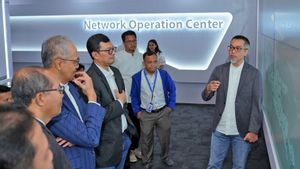JAKARTA - As countries in Asia and Africa continue to jump to use computerized systems to run their economies and governments, cybersecurity is becoming increasingly important.
Just imagine, if Gojek, Grab, Bukalapak, Tokopedia, and other applications were hacked, how would the Indonesian economy run in the future? Possibly, a lot of data will be lost or trading and trading will not be carried out properly. Losses can reach trillions of rupiah in just one day.
Cybersecurity is the protection of computer systems and networks from the disclosure of information, theft, or damage to their hardware, software, or electronic data, as well as from interference or misdirection of the services they provide.
According to the Information Systems Audit and Control Association (ISACA), an international professional association focused on IT governance, global cybercrime losses are expected to reach USD 6 trillion by the end of this year.
Asia and particularly Africa have not been as affected by large-scale cyberattacks as the rest of the world. However, the continent is no stranger to problems in general, as incidents of hacking into individual and institutional bank accounts are nothing new here.
With a continued move towards a computer-based economy characterized by the Internet of Things (IoT) and Artificial Intelligence (AI), Africa may soon become a target for even greater cybercrime.
Israel, a country that arguably leads the world in cybersecurity is a great example of how African countries must attach great importance to cybersecurity if they are to successfully pursue and achieve computer-driven economies and governments.
Among other things, the state established a National Cyber Directorate which is responsible for all aspects of cyber defense in the civilian realm, from formulating policies and building technological forces to defense operations in cyberspace.
It provides incident response and guidance services to all civilian entities as well as all critical infrastructure in the Israeli economy and works to increase the resilience of civilian cyberspace.
According to Yigal Unna, Director General of the Directorate, they have a hotline for citizens to call and report any incidents that might look like cyber threats. These are some of the things that show Israel's great concern for cybersecurity, but that's not all.
The country is also investing heavily in the sector, offering hundreds of millions of dollars to cyber technology startups every year, in addition to providing a strong education to young people about cyber technology.
SEE ALSO:
In an interview with the media, Isaac Ben-Israel, a professor at Tel Aviv University, who is one of the pioneers in the cyber industry, highlighted the importance of computer technology in driving the economy but noted that there is a "dark side" of technology that users should pay attention to.
“The dominant technology since the mid-20th century until now is computer technology. Now, if you want to be an advanced economy, you have to base on dominant technology. However, you have to remember that once you get ahead economically, there is a dark side to it. Many problems arise, and cyberattacks are one of them", he told The Newtimes.
So it is necessary to invest in adequate protection mechanisms for all infrastructure that uses computerized systems, continue to build the capacity of people who will have sufficient cyber knowledge to defend companies, countries, and so on, in addition to making people aware to be careful. and be responsible when using computerized systems.
During last week's Cyber Week Conference in Israel, Prime Minister Naftali Bennett spoke about the launch of the "Global Cybernet", a network for sharing information on cyber defense between countries.
The network currently consists of about 1.400 cyber professionals in Israel, including analysts, researchers, and information security managers, from various organizations in the country who share information about their attacks or suspicions.
The English, Chinese, Japanese, Arabic, and French versions are automatically generated by the AI. So there may still be inaccuracies in translating, please always see Indonesian as our main language. (system supported by DigitalSiber.id)


















